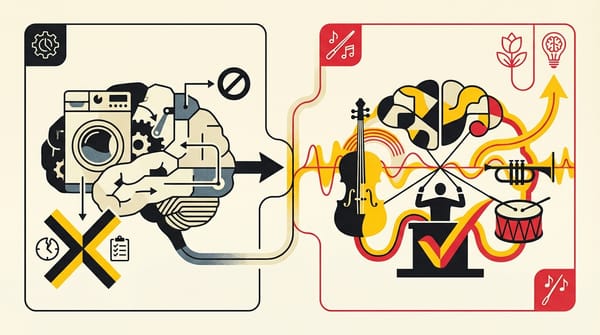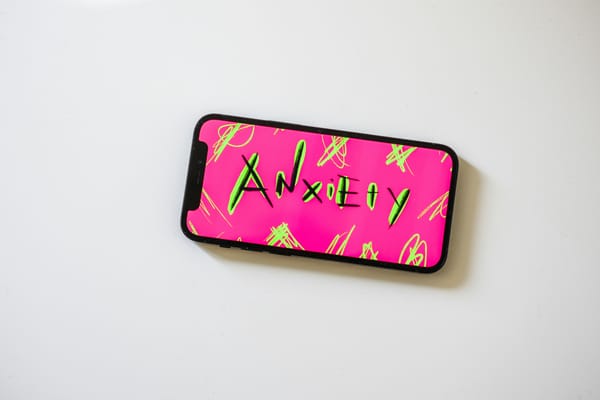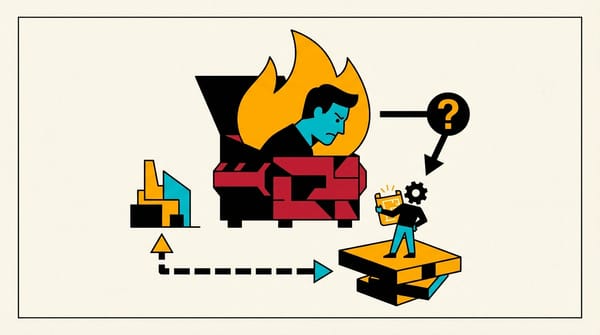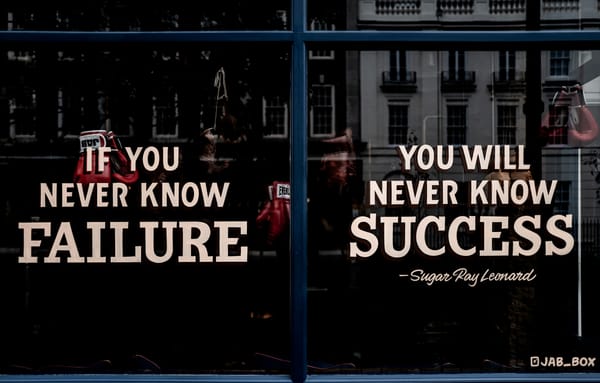How to Start Over?
Discover practical steps to start over in life! Learn how to embrace change, pursue passions, and create a fresh beginning today.

🤖 This podcast is generated using AI technology. Disclaimer: The generated content may contain errors.
When I attended preparatory courses before art school, I fell in love with painting and really wanted to draw. But my parents didn't care - due to an unfounded fear of military service and the fact that my aunt played the accordion, they bought me an accordion and enrolled me in this specialty along with piano. My mother was afraid of the army and hazing, so she convinced herself that if I played the accordion, I would be accepted into the orchestra, and nothing would happen to me there. Spoiler - I never served in the army, and I hated the accordion. I studied for eight years instead of seven because the smallest accordion covered my face so much that I couldn't see the music - I had to stay an extra year to grow taller. In short, I studied accordion, solfeggio, etiquette, art history, and more. But life, as often happens, made its own adjustments. And love for the instrument never developed over those years.
During university, I found myself in a situation where I needed money and started working in food service. First at McDonald's, then at Burger King. Unlike many others, I quickly climbed the career ladder thanks to my curiosity and work ethic. After 4 years, I had already become the head of training, responsible for 12 restaurants in Saint Petersburg.
But the higher I climbed, the more strongly I felt that this work wasn't bringing me satisfaction. When I burned out at McDonald's, hitting the ceiling while waiting for new restaurants to open, I changed companies, but the problem remained. I was still working myself to exhaustion. Every day I felt my energy draining away like water through my fingers. The thought of throwing everything away and starting from scratch was frightening - after all, I had already reached a certain level, I was known in St. Petersburg and Moscow, I was scared of financial obligations, interest was fading, and such rapid career jumps were limited by the general lack of development in the restaurant industry - everything was more or less the same.
The turning point came when I realized I could no longer ignore the fact that I was starting to sink in the swamp of stability. I decided to take a risk and change fields, despite the fear and uncertainty. And I promised myself never to work in restaurants again. And I broke that promise. Twice.

Here are some steps that helped me get through this difficult period
- Recovery. Before making any radical decisions, I took a pause to recover. This could be a vacation, meditation, therapy - any practices that help you "reset." I flew to the seaside, came back a couple of months later, and began to restart myself, putting my life back in order.
- Self-analysis. I asked myself questions like: "What truly inspires me?", "What skills do I want to develop?", "Where do I see myself in 5-10 years?" The answers I got were, of course, cliché and silly, but I didn't think so at the time. Either way, these answers helped determine my direction. In my case, as Gogol writes - according to St. Petersburg custom, the wind blew from all four directions - well, for me the wind was blowing in all four directions. I'm telling you all this because it's normal to look back and tell yourself how foolish you were. At any given moment, we make the best decisions we're capable of. And I'm also telling you this because it irritates me how all self-help books talk about these steps so idealistically. Perhaps someone out there has a plan, follows it, and never makes mistakes, their steps precisely analyzed and calculated to the smallest probability, but such people are rare.
Allow yourself to be imperfect. - Using current skills. I analyzed which skills from my current job could be useful in a new field. For example, project management experience proved very valuable, and marketing lessons from McDonald's and Burger King helped me better define my direction.
- Financial cushion. I tried to save money to have a reserve for the transition period to a new position. But I miscalculated my ability to budget - the financial cushion ran out much faster than I had planned. Even if you're good at saving, know that a financial cushion runs out very quickly, twice as fast as you calculate.
- Micro-steps. I set small, achievable goals. For example, taking an online UX/UI design course or writing my first blog post, which I never wrote - I was convinced no one would be interested. I attended English lessons, read Ogilvy's works, and followed blogs of famous Russian designers.
Here are the steps I didn't take and later regretted
- Gradual transition. I quit immediately, saying goodbye to everyone, because I was young, overconfident, properly raised, and principled. I couldn't just collect a salary while transitioning to a new level, though I could have. I wouldn't do that now. I would have started the quiet quitting process - especially since my company deserved it. After I left, it took three employees to replace me, and I remained on call for another year. Had I been smarter, I would have slowed down, worked for my salary, and simultaneously started learning a new field - digital products, content marketing, and communication design. This would have reduced financial risks and given me time to prepare.
- Networking. I should have started communicating with people from my area of interest and attending industry events. This would have helped me better understand the new field and find opportunities. But I didn't do any of this - instead, I started using a sledgehammer to crack nuts, shooting in the dark.
Practical steps for financial transition
- Create a 6-month financial reserve, if possible. A golden rule for life - set aside 10 percent of your salary for investments
- Review and optimize current expenses (I'm not the best advisor here - this is my weak spot)
- Consider temporary support systems (family, partner) - you understand what I mean
- Explore the possibility of restructuring major financial obligations. That's what I did with my mortgage: successfully restructured it with a lower interest rate
- Look for part-time opportunities in the new field while maintaining your current job. That's how I transitioned from helicopters to television: I started doing freelance projects for Red Square 6 months before I got hired there
Dealing with the Fear of the Unknown
During my move from Russia to Spain, I learned that this knot in my stomach wasn't intuition warning of failure, but rather a signal of a growth zone.
Remember: You are your most reliable asset
Think about this: every skill that brought you to your current position - your persistence, analytical thinking, ability to learn - isn't tied to any specific industry. These qualities are part of who you are.
I've seen many professionals, from former executives to teachers, going through similar changes. They all share one common trait: they didn't just survive, but found ways to thrive by applying their key strengths in new contexts.
Where to Find Motivation
We all know that soul-crushing feeling when we force ourselves to work in a toxic environment, watching our mental and physical health deteriorate, telling ourselves "it's just a job." But here's what makes you special: you decided to stop normalizing your own suffering.
This decision to put your wellbeing first isn't just brave - it's strategic. In today's rapidly changing job market, the ability to adapt and reinvent yourself has become more valuable than any single set of skills.
Not Starting Over, But Building on Experience
Your previous "good but toxic" workplaces served their purpose - they taught you what you don't want and helped you accumulate financial resources for this transition. Now it's time to use that knowledge and those resources to build something better.
Remember: it's not about starting from scratch, but about building on everything you've already achieved. Your experience hasn't disappeared - it has transformed into wisdom that will guide your next chapter.
Caring Advice: What You'll Hear in Therapy
Here are some recommendations that might be helpful in our situation:
- Give yourself time to recover. Burnout is a serious condition - don't rush into new activities immediately.
- Explore your true interests. Perhaps there's a field where your project management skills could combine with creative ambitions?
- Start small. Try implementing a small creative project alongside your main job.
- Find support. This could be a coach, mentor, or community of people going through similar changes.
- Be ready for discomfort. The transition period is always challenging, but it's a normal part of the growth process.
- Celebrate small victories. Every step in a new direction is success, even if it seems insignificant.
- Be patient with yourself. Building a new career takes time - don't expect instant results.
Remember that burnout isn't the end, but an opportunity for reassessment and growth. Your experience can become the foundation for creating a more harmonious and fulfilling career. The key is to not be afraid to act and trust the process.
Summary of Conclusions
I remember how scary it was to take the first steps in a new direction. But each small success added confidence. Gradually, I transitioned into the digital sphere, where I could apply my project management and training experience. Communication design and content work were added to this.
Here's the truth about career changes that "follow your dream" articles don't mention: yes, you'll probably take a temporary pay cut. It's like learning to walk again - you don't start with a marathon. But here's the good news: you're not starting from zero.
Think about this: you bring years of professional maturity, problem-solving skills, and emotional intelligence to your new field. These transferable skills are your secret weapon, helping you climb the career ladder faster than complete beginners.
Now, looking back, I understand that the period of uncertainty was a necessary stage of growth. It taught me adaptability, courage, and how to trust my intuition. I would say that, but those would be lofty words - in reality, everything was scary, lonely, and confusing. I was 22, still a child, and in some ways, I remain one now.
Today I did almost the same thing: I got tired of pretending to be someone I'm not, adapting to everyone, changing my resume for every vacancy, and choosing jobs for immigrants. I gave up on all that and allowed myself to be myself - come what may. After all, I'm a smart and awesome digital product manager and strategist.
Finally, Here Are Some Questions for Reflection
- What does "dream job" mean to you? What would your ideal workday look like?
- Which elements of your current job do you actually enjoy? Can they be integrated into a new career?
- If you had a financial cushion for a year, what would you do?
As always, I invite you to share your opinion in the comments
With love 😽 🤗 😘
K




